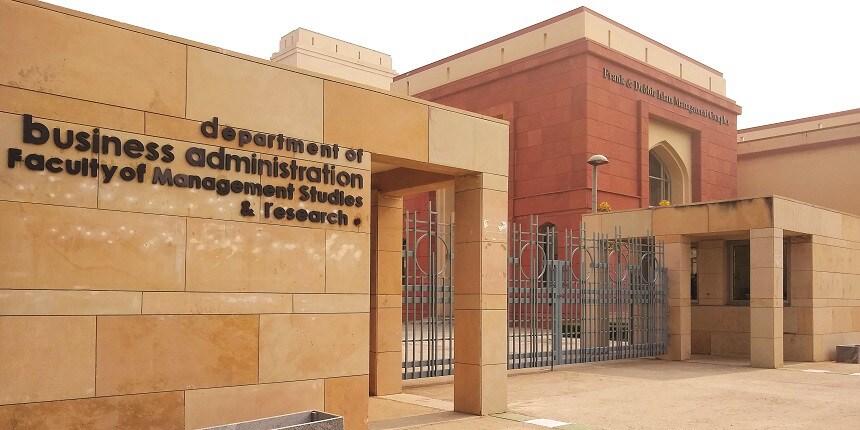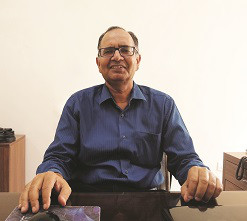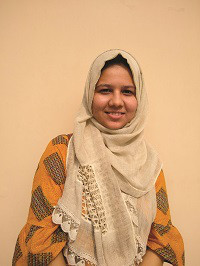AMU launches first Islamic Banking MBA course
Abhay Anand | December 16, 2019 | 12:16 PM IST | 4 mins read

NEW DELHI: Growing up in Aligarh, Abdullah Zaman noticed that many from his community shunned a certain institution that everyone else took very seriously – banks.
 “I noticed that a large section of my community is excluded from the financial market, does not invest in anything,” he said. Islamic law, the Sharia, prohibits usury, or income from interest, making conventional banking unacceptable to orthodox Muslims. “I wanted to do something where we can bring them into the banking system,” said Zaman. In October, he joined Aligarh Muslim University’s newly-launched two-year management programme in Islamic Banking and Finance – the first such degree programme in the country.Nearly a decade ago, in 2010, AMU had become the first institution to offer a one-year post-graduate diploma course in the subject. The Department of Business Administration, which ran that programme, felt the need to convert it into an MBA to improve its students’ employment prospects in a sector buoyed largely by the prosperity of Middle Eastern countries.
“I noticed that a large section of my community is excluded from the financial market, does not invest in anything,” he said. Islamic law, the Sharia, prohibits usury, or income from interest, making conventional banking unacceptable to orthodox Muslims. “I wanted to do something where we can bring them into the banking system,” said Zaman. In October, he joined Aligarh Muslim University’s newly-launched two-year management programme in Islamic Banking and Finance – the first such degree programme in the country.Nearly a decade ago, in 2010, AMU had become the first institution to offer a one-year post-graduate diploma course in the subject. The Department of Business Administration, which ran that programme, felt the need to convert it into an MBA to improve its students’ employment prospects in a sector buoyed largely by the prosperity of Middle Eastern countries.
Twenty students were admitted this year through a common admission test conducted by the university. The first batch includes nine women and students from other religious backgrounds, said Valeed Ansari, dean, Faculty of Management Studies and Research. All applicants interested in an MBA write the same test and are then placed in a programme during counselling.
To the Gulf
Finding few opportunities in India, the vast majority of the diploma-holders went to the Gulf countries and elsewhere for work. When they sought employment, “there was a feeling that if they had a degree instead of a diploma, they would have got better opportunities or pay-package,” said Ansari.
Advice was sought from experts in the world of Islamic banking. “We also have new faculty members with good idea about the sector and we will also involve guest faculty,” he said. The course has been designed largely by professional Islamic bankers and its framework allows students to learn more from various online sources.
Teaching of the main subject – the specialisation – will start only in the third semester.
Islamic banking
The fundamental principles of Islamic banking are different from that of conventional banking.
As AMU teachers and students pointed out, certain faiths prohibit the use of financial instruments that pay interest or require speculation. The banking system in India relies on interest and as a result, deters those belonging to such faiths from entrusting their savings to it.
 “There is a large section of our population which does not want to keep their money in the traditional banks but the Islamic banking system could help with their financial inclusion and the money will remain in the system,” said Ansari. “The Raghuram Rajan Committee (2008) also recommended faith-based banking system and this was because a sizeable section of the population remains left out of the conventional banking system.”
“There is a large section of our population which does not want to keep their money in the traditional banks but the Islamic banking system could help with their financial inclusion and the money will remain in the system,” said Ansari. “The Raghuram Rajan Committee (2008) also recommended faith-based banking system and this was because a sizeable section of the population remains left out of the conventional banking system.”
Islamic banking distributes profits instead of interests. A faculty member explained that when a customer decides to purchase a car, he does not take out a car loan from the bank and pay interest on it. Instead, the Islamic bank buys the car and sells it to the customer, collecting payments in monthly instalments.
He further explained that Islamic investment products are “asset-backed” and are governed by additional Islamic rules which make it financially more stable. “Islamic instruments like bonds and funds that are looking at Shariah-compliant investments will be able to meet the needs of Muslim investors from within India and externally from other parts of the world,” said Ansari.
Students and teachers believe that its ban on usury and speculation make Islamic banking a low-risk and relatively recession-proof exercise. “If we look at the recession of 2008, when all the banking and financial systems of the world failed, Islamic banking did not suffer much of its impact,” added Zaman.
New opportunities
On the sector’s growth, Ansari pointed out that as per one estimate, the Islamic finance sector could be valued at $4 trillion by 2020 – is supported mainly by the prosperity of the Middle Eastern countries. Several international banks have opened Islamic Banking divisions to cater to the Middle East. There are over 400 banks spread over 60 countries and are expected to collectively create around 30,000 jobs in the forthcoming financial year.
 These opportunities have attracted students from various academic backgrounds. Sara Khan from Bulandshahr graduated in science and joined the Islamic Banking programme because she felt it “connects her faith with the corporate world”. She hopes to work in Malaysia and come back and work in India once she has learnt more. She said: “The advantage of doing this is that Islamic banking is independent of financial crisis, as we know when slowdown comes the economy of any country gets disturbed, but this is one sort of career or industry which gets least affected.”
These opportunities have attracted students from various academic backgrounds. Sara Khan from Bulandshahr graduated in science and joined the Islamic Banking programme because she felt it “connects her faith with the corporate world”. She hopes to work in Malaysia and come back and work in India once she has learnt more. She said: “The advantage of doing this is that Islamic banking is independent of financial crisis, as we know when slowdown comes the economy of any country gets disturbed, but this is one sort of career or industry which gets least affected.”
Another student, Mohammad Irfan Khan, said he chose the course because he thinks the practices it promotes are “ethical and beneficial to the country and the people who are practising it”. He was happy to be in the first batch.
While the Islamic countries of the Middle East have drawn most of the students trained by AMU, its teachers hope that the sector will expand in India as well. “The growth of this sector offers opportunities to professionals with the relevant expertise and also to banks to expand their footprint in India,” said the dean.
Write to us at news@careers360.com
Follow us for the latest education news on colleges and universities, admission, courses, exams, research, education policies, study abroad and more..
To get in touch, write to us at news@careers360.com.